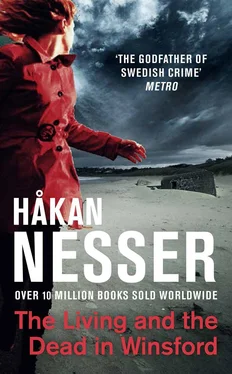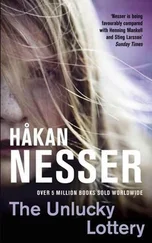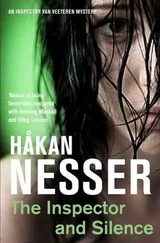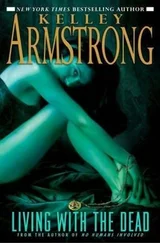Håkan Nesser - The Living and the Dead in Winsford
Здесь есть возможность читать онлайн «Håkan Nesser - The Living and the Dead in Winsford» весь текст электронной книги совершенно бесплатно (целиком полную версию без сокращений). В некоторых случаях можно слушать аудио, скачать через торрент в формате fb2 и присутствует краткое содержание. Год выпуска: 2013, Издательство: Mantle, Жанр: Криминальный детектив, на английском языке. Описание произведения, (предисловие) а так же отзывы посетителей доступны на портале библиотеки ЛибКат.
- Название:The Living and the Dead in Winsford
- Автор:
- Издательство:Mantle
- Жанр:
- Год:2013
- ISBN:нет данных
- Рейтинг книги:4 / 5. Голосов: 1
-
Избранное:Добавить в избранное
- Отзывы:
-
Ваша оценка:
- 80
- 1
- 2
- 3
- 4
- 5
The Living and the Dead in Winsford: краткое содержание, описание и аннотация
Предлагаем к чтению аннотацию, описание, краткое содержание или предисловие (зависит от того, что написал сам автор книги «The Living and the Dead in Winsford»). Если вы не нашли необходимую информацию о книге — напишите в комментариях, мы постараемся отыскать её.
The Living and the Dead in Winsford — читать онлайн бесплатно полную книгу (весь текст) целиком
Ниже представлен текст книги, разбитый по страницам. Система сохранения места последней прочитанной страницы, позволяет с удобством читать онлайн бесплатно книгу «The Living and the Dead in Winsford», без необходимости каждый раз заново искать на чём Вы остановились. Поставьте закладку, и сможете в любой момент перейти на страницу, на которой закончили чтение.
Интервал:
Закладка:
Life goes on as usual, despite everything, I think, and sit down at the table nearest the fire. Castor lies down at my feet.
It really does. Life. It goes on as usual. And Castor and I will continue to wander around together as before.
I sit wallowing in that grandiose but perceptive thought as we drive to Dulverton after our lunchtime gluttony at The Royal Oak. As a tribute to this eternal truth and practical process we are going to buy some Christmas food. If we can find any: it’s the twenty-third today, and high time. . The road is rather bumpy and slippery after the snow, but even so Castor sits in the front passenger seat without a safety belt, so that I can keep stroking him.
Where have you been? I think. Over and over again. Where have you been? Where have you been?
But I don’t really care just now. Perhaps I don’t really want to know, and the main thing is that he’s back. I’ll never let him go out again on his own in the darkness. Not as long as we’re both alive.
I manage to keep such speculation at arm’s length — presumably the season of the year helps in that respect. Christmas Eve, Christmas Day, Boxing Day. We don’t go anywhere, we stay in Darne Lodge and go for long walks over the moor, one in the morning and one in the afternoon: down towards the village, but only halfway — it’s too muddy to go all the way; uphill towards Wambarrows with long detours in the direction of Tarr Steps. Tarr Steps from the good side, not the Devil’s road.
And I don’t let Castor out of my sight for a single second.
I read about John Ridd and Lorna Doone, almost to the end. I called in at the second-hand bookshop and collected Bessie Hyatt’s two novels when we were doing our Christmas shopping, but they can stand next to Dickens and wait for a while. I cook and keep the fire going. We eat, we cuddle on the sofa and exchange our thoughts. We’ve nothing to complain about. Nothing at all.
The weather is so-so. The temperature is close to freezing, but there’s no more snow: what did fall has melted away. Even so, Castor wears a dog jacket when we are out walking. We don’t meet a soul out on the moor, not a single one for three days. The ponies don’t seem to be celebrating the birth of Jesus: we come across groups of them here and there as usual. It looks as if they move around during the night, and you never know where they’re going to appear the next morning. But not a day passes without our seeing them somewhere or other. It seems to me that they regard Darne Lodge as a sort of hub, a central point that they can keep an eye on and keep within range.
Just like Castor and I do, of course. This two-hundred-year-old stone dwelling on the moor is our home, for better or worse. It’s not yet time to start thinking about roads leading away from it. For now it’s somewhere to stay and make the most of.
To stick to routines.
Menelaus . Wrong.
Agamemnon . Wrong.
Achilles . Wrong.
43
During the thirty or more years we have spent together we have socialized with lots of people — of course we have.
But we don’t have many lasting friends. I don’t feel especially worried or frustrated about writing that, it’s just a statement of fact. When we have attended private dinner parties or sessions in pubs, it has nearly always been a case of meeting colleagues and their associates. My colleagues or Martin’s colleagues. Mainly the latter. Indeed, I think I can say that I’ve been introduced to about three times as many academics as he has been to television folk of one kind or another, colleagues who in response to my smiling introduction have felt obliged to shake hands with my husband, the literature professor Martin Holinek.
But of course colleagues can also be friends, and there was one couple who were quite close to us. Whom I didn’t hesitate to confide in during the whole of the eighties and into the nineties. They were called Sune and Louise. Sune and Martin had become acquainted at grammar school, and had begun studying literary history at the same time at the same university. Incidentally, Sune is that lecturer who maintains he saw Jacqueline Kennedy drinking coffee at a cafe in Uppsala.
Louise entered Sune’s life at about the same time as I became intimate with Martin, and they moved into a shared flat in Åsögatan in the Söder district of Stockholm about six months after Gunvald was born. Louise was working at a bank in those days, and as far as I know she still does — or at least still works in the bank world.
Sune had a very poverty-stricken childhood. He grew up as the only child of a single mother who managed to just about make a living as a cleaner in a little village in Värmland. Thanks to a woman teacher who realized how gifted he was, he had a decent education: she supported both Sune and his mother financially while he was at grammar school as a boarder, and continued to finance his advanced academic studies. Sune always referred to this teacher, whose name was Ingegerd Fintling and had been dead for about a year when we first met, as an angel in human guise. In the seventies both Sune and Martin were naturally very left-wing, and I think that Sune was a sort of political alibi for Martin. Martin himself came from the upper middle-class, but it would be hard to imagine anything more lower-class than the son of a cleaner. For several years Martin was almost jealous of his friend.
But as time passed, needless to say the red paint faded away from Martin, even though he liked to insist for many years that he was a social democrat. In any case, we socialized with Sune and Louise quite a lot during those decades: after all, we lived only a few blocks away from them in the early eighties; and they had their first and only child, Halldor, about halfway between our two.
I remember being very fond of Louise without really understanding why. She was an unusually quiet and friendly person — perhaps that was why. She didn’t seem to expect much from life, and was always satisfied with herself and her circumstances. Whenever we met she was happy to allow Sune and Martin to make the elaborate gestures, lay down the political manifesto and go on about politics — but not in a submissive sort of way. She often laughed at them, and we sometimes did so in partnership; but there was never any trace of malice or irony in Louise, just a sort of mild and amused tolerance. Boys will be boys, after all.
It was several years before I realized that she was religious. Deeply and privately so, without any fuss. When the penny dropped I asked her why she hadn’t told me, and she said it was because I had never asked.
And she added that she felt no need to advertise her beliefs. Nor to discuss them. She didn’t go to church, and she didn’t believe in organized religion. She and God had a relationship of their own, it didn’t need any augmentation.
I wanted to know how she had achieved that relationship, if it was something she had experienced ever since she was a child: she explained that she had a revelation when she was fifteen, and it just went on from there.
I wondered how she reconciled her faith with all the left-wing chatter, and pointed at our living room where Martin and Sune were absorbed by an analysis of some radical political subtlety or other. Louise and I were standing in the kitchen, preparing the dessert as the gentlemen had been responsible for the main course. We were both stone-cold sober as I was pregnant with Synn and Louise was breast-feeding. Halldor and Gunvald must have been fast asleep in our warm bedroom.
‘It’s not a problem,’ said Louise. ‘I have no desire to sit there debating Our Lord and socialism with Martin, but inside my head everything is straightforward. God comes first, if you understand what I mean.’
Читать дальшеИнтервал:
Закладка:
Похожие книги на «The Living and the Dead in Winsford»
Представляем Вашему вниманию похожие книги на «The Living and the Dead in Winsford» списком для выбора. Мы отобрали схожую по названию и смыслу литературу в надежде предоставить читателям больше вариантов отыскать новые, интересные, ещё непрочитанные произведения.
Обсуждение, отзывы о книге «The Living and the Dead in Winsford» и просто собственные мнения читателей. Оставьте ваши комментарии, напишите, что Вы думаете о произведении, его смысле или главных героях. Укажите что конкретно понравилось, а что нет, и почему Вы так считаете.












